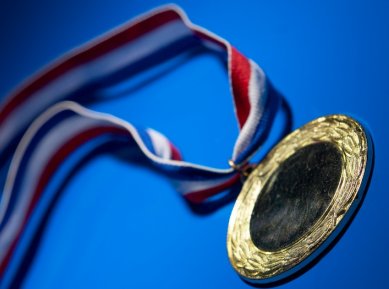The Gottfried Wilhelm Leibniz Prize is the highest honor in the German research landscape. This year, ten outstanding researchers were chosen by the Deutsche Forschungsgemeinschaft (DFG, German Research Foundation) from 120 nominees. Three of the prizewinners are from the natural sciences, three from the humanities and social sciences, three from life sciences, and one from engineering. Each honoree will receive prize money of 2.5 million EUR to fund further research.
The following researchers received the 2016 prize in the DFG’s Gottfried Wilhelm Leibniz Program:
- Professor Frank Bradke, Neuroregeneration, German Center for Neurodegenerative Diseases (DZNE), Bonn
Bradke’s research focuses on regenerative neurobiology. He investigated how axons, the projections of nerve cells, can be encouraged to grow again after being severed.
- Professor Emmanuelle Charpentier, Infection Biology, Max Planck Institute for Infection Biology, Berlin
Charpentier has made important contributions to CRISPR-Cas9, a cutting tool which allows a genome to be modified at any point with great efficiency and reliability.
- Professor Daniel Cremers, Computer Vision, Technical University Munich
Cremers’ research has brought the field of image processing and pattern recognition an important step closer to its goal of reproducing the abilities of human vision with camera systems and computers.
- Professor Daniel James Frost, Mineralogy/Experimental Petrology, University of Bayreuth
Frost studies the formation, structure, and development of planets and has fundamentally expanded our knowledge of the structure of the Earth’s crust and core and their development over time.
- Professor Dag Nikolaus Hasse, Philosophy, University of Würzburg
Hasse has demonstrated how intensive the cultural exchange was between the Orient and the Occident from the Middle Ages to the Enlightenment. This opened up fundamental new insights into the beginnings of modern Europe.
- Professor Benjamin List, Organic Chemistry, Max Planck Institute for Coal Research, Mülheim/Ruhr
List discovered the proline-catalysed intermolecular aldol reaction, a reaction that was one of the foundations of organocatalysis.
- Professor Christoph Möllers, Law, Humboldt University, Berlin
Möllers works on public law, specifically constitutional law. He considers the core questions of public law from the perspective of democratic theory and enriches juridical thinking with a comprehensive theory of democratic legitimacy.
- Professor Marina V. Rodnina, Biochemistry, Max Planck Institute for Biophysical Chemistry, Göttingen
Rodnina made pioneering contributions to the understanding of the function of ribosomes, which synthesize proteins from amino acids, and to how they work with maximum precision and minimal errors.
- Professor Bénédicte Savoy, History of Modern Art, Technical University Berlin
Savoy forges links between German and French art history in a European perspective, and also enjoys considerable success as an organizer of German-French exhibitions.
- Professor Peter Scholze, Arithmetic Algebraic Geometry, University of Bonn
Scholze answered fundamental questions in arithmetic algebraic geometry which had remained unsolved for decades, such as the proof of the so-called Langlands conjecture for p-adic local bodies.
Recent Publications by the Recipients
- Microtubule Organization in the Axon: TRIM46 Determines the Orientation,
Michele Curcio, Frank Bradke,
Neuron 2015, 88, 1072–1074.
DOI: 10.1016/j.neuron.2015.12.006 - Toward Whole-Transcriptome Editing with CRISPR-Cas9,
Dirk Heckl, Emmanuelle Charpentier,
Mol. Cell 2015, 58, 560–562.
DOI: 10.1016/j.molcel.2015.05.016 - Variational Depth From Focus Reconstruction,
Michael Moeller, Martin Benning, Carola Schonlieb, Daniel Cremers,
IEEE Trans. Image Process. 2015, 24, 5369–5378.
DOI: 10.1109/TIP.2015.2479469 - Is the transition zone a deep reservoir for fluorine?,
Mathilde Roberge, Hélène Bureau, Nathalie Bolfan-Casanova, Daniel J. Frost, Caroline Raepsaet, Suzy Surble, Hicham Khodja, Anne-Line Auzende, Guillaume Fiquet,
Earth Planet. Sci. Lett. 2015, 429, 25–32.
DOI: 10.1016/j.epsl.2015.07.051 - Avicenna’s epistemological optimism,
Dag Nikolaus Hasse,
Interpreting Avicenna: Critical Essays, Cambridge University Press, 2013.
ISBN:978-0-521-19073-2 - Disulfonimide-Catalyzed Asymmetric Reduction of N-Alkyl Imines,
Vijay N. Wakchaure, Philip S. J. Kaib, Markus Leutzsch, Benjamin List,
Angew. Chem. Int. Ed. 2015, 54, 11852–11856.
DOI: 10.1002/anie.201504052 - Ten years of global administrative law,
Christoph Möllers,
Int. J.Constit. Law 2015, 13, 469–472.
DOI: 10.1093/icon/mov023 - Activities of the peptidyl transferase center of ribosomes lacking protein L27,
Cristina Maracci, Ingo Wohlgemuth, Marina V. Rodnina,
RNA 2015, 21, 2047–2052.
DOI: 10.1261/rna.053330.115 - Plunder, Restitution, Emotion and the Weight of Archives: A Historical Approach,
Bénédicte Savoy,
Echoes of Exile, Moscow Archives and the Arts in Paris 1933–1945, DeGruyter, 2014.
ISBN: 978-3-11-029065-3 - On torsion in the cohomology of locally symmetric varieties,
Peter Scholze,
Ann. Math. 2015.
DOI: 10.4007/annals.2015.182.3.3


